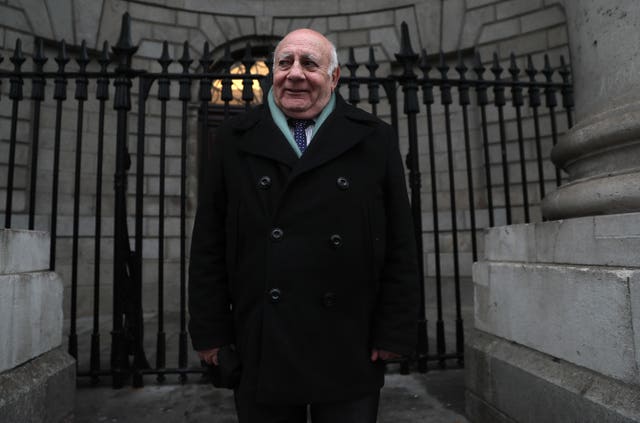A former financier who laundered some of the proceeds of the Northern Bank robbery has sought to compel the Irish state to explain what happened to around £3 million seized from his home.
On Thursday at the High Court in Dublin, Ted Cunningham mounted judicial review proceedings against the Garda Commissioner, head of the Criminal Assets Bureau (CAB), the Director of Public Prosecutions and the Danske Bank – the named assumed by the Northern Bank in 2012 – over the accounting and inventory of the process in which the money was taken.
The money was removed from Mr Cunningham’s former home, in Church View, Farran, Co. Cork on February 17 2005, and his barrister argued there was no valid forfeiture order issued at the time of conviction to seize the money.
The Northern Bank robbery was one of the biggest bank robberies in British and Irish history when £26.5 million was stolen during the heist in Belfast in December 2004.
Police have said that they believe the Northern Bank robbery was the work of the IRA.

The conviction was later quashed on the basis of a problem with the warrant used by gardai, and deemed unconstitutional by the Supreme Court.
Due to the Supreme Court ruling, Mr Cunningham was tried a second time in February 2014, he pleaded guilty to laundering a total of £275,400 and receiving cheques totalling 200,000 euros and received a five-year suspended sentence.
Barra McGrory QC, the former director of public prosecutions in Northern Ireland, and barrister Eamonn Dornan argued that Mr Cunningham has a constitutional entitlement to an explanation on where the money went.
“We’re not asking the court to give the money back,” Mr McGrory said.
“That’s not the issue, we’re asking the state to set out a proper account on the basis of which they took this action.”
Mr McGrory stated that Mr Cunningham was “blissfully unaware” of the money being removed from the jurisdiction and thought “that it would at least have a more thorough process, in terms of checking on what legal authority it seeks to take that action”.
The barrister added: “The Superintendent thinks there’s a forfeiture order, and the State Solicitor doesn’t demur, however the State Solicitor has the responsibility to check court records and ensure there is before authorising any removal by the state of a citizen’s property, and what he failed to do manifestly was to put in place those checks and balances that protect citizens from unconstitutional abuse.
“We wouldn’t be here had the state solicitor checked with court and looked to see if an order was drawn up, obviously it wasn’t, or we would have it,” Mr McGrory argued.
Mr McGrory also told the court that Mr Cunningham claims he was stopped in Heuston train station by a police officer who told him he was “Special Branch” and tried to discuss the trial with him.
A statement supplied by the police officer agreed that he did speak with Mr Cunningham at the station but says he did not tell him he was Special Branch or ask him about proceedings.
Mr McGrory added that it was “very odd” and “coincidental” that the encounter took place.
The barrister for the state, Seamus Clarke, argued that not only had Mr Cunningham not proved that the money was his, he was also way beyond the time limit to apply for judicial review, which is three months, and argued the clock would have started in 2014 after his sentencing.
“It is clear that the prosecution in proceedings asserts this was Northern Bank’s money and not his, and when no appeal came in, the state is entitled to take the view that he accepts it’s not his money.
“No appeal was taken at that time in 2014, it was later set out in a letter to Mr Cunningham in 2017, so let’s say the clock starts then – with the best will in the world.
“He did nothing for a further six months, he was sitting on his hands.
“Giving the applicant a benefit of the doubt – that he doesn’t deserve – the order sets out in clear terms, the time period starts running.
“There is a strict time limit, you can’t just turn up on a hearing date and say ‘time doesn’t really matter in this case’, you’d have chaos.”
Judge Miriam O’Regan, who noted a number of times she would not disregard the rules on time limits for judicial review, said she would have a decision in the coming weeks.






